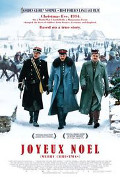
France 2005
Directed by
Christian Carion
116 minutes
Rated M
Reviewed by
Sharon Hurst

Joyeux Noel
Synopsis: On Christmas Eve 1914, in Northern France, German soldiers are fighting against French and Scottish troops. All are bogged down in the horrific and merciless trenches. Remarkably, on that night, men from all three sides down their weapons and call a temporary truce."If we could read the secret history of our enemies, we should find in each man's life sorrow and suffering enough to disarm all hostility," wrote the poet Henry Wadsworth Longfellow. This is precisely what this beautiful and moving film deals with. Even more astonishing, it is based on fact. Director/writer Carion discovered a wealth of information in French, German and British archives, about what happened that night and the next day - enemies playing soccer together, sharing food, showing photos, and taking time out to bury their dead. When confronted with each other in person, they realised their common humanity and the folly of this war into which their commanders were forcing them.
From his research, Carion created characters based on many who existed, as well as some fictional ones. Thus we have the true incident of a German tenor who sang and was applauded by the French troops turned into the character of Nikolaus Sprink (Benno Furmann), an opera star reluctantly drafted into the military. His lover, Anna Sorenson (Diane Kruger), a beautiful soprano, will stop at nothing to drag her man away from the war. There is Palmer, (Gary Lewis) a compassionate Anglican priest with the Scottish regiment, and Audebert (Guillaume Canet) a French lieutenant who pines for his family and hides his fear from his men. Horstmayer (Daniel Bruhl) is a young Jewish German lieutenant whose hard-lined stance will be changed by the tragedy he sees around him.
Like many films of this nature Joyeux Noel aims to show the futility of war, and that it is the common soldier who suffers at the hands of the generals and policy makers. A strong opening scene sets the political agenda, as school children from their respective countries recite poems in German, French and English, all glorifying war and encouraging annihilation of the enemy. We then see young Scottish brothers celebrating war's onset with the fateful line "At last something is happening in our lives". But the tears in the priest's eyes as he hears the grim news show his greater wisdom and knowledge of what lies ahead. As we are introduced to the main characters from each country, it is their commonality that stands out - all are leaving loved ones, all have some sort of lucky charms with them, all are full of fear and apprehension. After the early brutal scenes of fighting, the stillness that falls over the battlefield on Christmas Eve is truly moving and inspiring. As Sprink sang and the Scots joined in with the bagpipes, I found a decided lump in my throat. The many acts of kindness and camaraderie that ensue bind the soldiers, but also put them in stark opposition to their superiors who view the whole thing as high treason.
With a lush orchestral score and magnificent scenery, as well as the stark harshness of the trench environment under snow, this is a good looking and powerful film.

Want more about this film?


Want something different?




